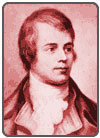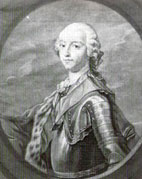ROBERT BURNS, Jacobite, freemason, poet and Scotland's national bard. |
When talking about Robert Burns, one always tends to think of him as Scotland's National Bard. There was, of course, a lot more to the man than the fact that his prose became the toast of the world, whether in Russia or the United States of America, Scotland or England when, year in, year out, people enjoy a plate of Haggis to Burns' poem ‘Address to a haggis'.
So, what else can we add to Burns' history?
We all know of his birth on January 25 th , 1759, in Alloway, near Ayr, in a clay cottage built by his father. His education was communal, that is to say that several neighbouring farmers decided to hire a teacher to educate their children. Encouraged by his father, Robert had a wide range of reading, including the English classics of his days, together with the local lore of Scotland, both from songs and tales. |
|
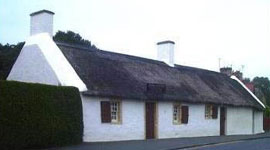 |
When his father William died in February 1784, Robert became the official tenant of the Farm of Mossgiel and it is from that time that he truly began to develop as a poet. Times for farmers in those days was hard and the land tenanted by Burns was, frankly, too small to support the needs of himself and his siblings. Following an early and rather less than successful romance with Jean Armour (her family did not think that Robert was quite good enough for her), he thought to emigrate to Jamaica. Had it not been for the fact that he had to raise cash for his passage across the water, when Robert offered his works to a publisher in 1786, Burns might have been lost as one of Scotland's literary Supremo. |
Known as ‘The Kilmarnock Edition', this first volume of Burns' numerous works (mainly satyres), became an instant success. With the money suddenly coming in, Burns' thoughts of leaving the country for warmer shores were, thankfully, shelved.
Following a second publication of further works in 1787, Robert was able (meaning, from her parents point of view, to afford) to marry Jean Armour that same year, moving to new premises, a farm at Ellisland, in Dumfriesshire. While the farm, admittedly, was less than a success, his writings kept them afloat and both left farming behind. This is when he was offered the position as Excise-man in Dumfries. It is during his numerous travels as an Excise-man that Burns was able to collect more oral Scots lore from the many people he met. Setting them on paper, they were saved for Scotland's posterity. |
| He was, also, a contemporary of Prince Charles Edward Stuart and was, in effect, related to him, though very distantly. Less known of Burns' background is that, though born within humble financial circumstances, he was kin to the best blood of Scotland through his Keith ancestry and had Scottish Earls, Dukes and Marquises as cousins. Most of them, including Burns' paternal great grandmother's family, fought on behalf of the Stewarts. Indeed, Burns' great grandfather, James Keith of Creigie, helped entertained King James VIII at the Keith's estate of Fetteresso in 1715 with the brother of the then 10 th Earl Marischal of Scotland. The Hon. James Francis Edward Keith, born in 1696, played a full part in the 1715 rising. Fleeing to France with James VIII, he came back in 1719 and took part in the battle of Glenshiel. He died in 1758, taking service in Russia, where he became Governor of Ukraine, to become a Field-Marshal under Frederick the Great of Russia. He was also the Provincial Grand Master of Scottish Freemasonry in Russia till he died in action in Hochkirk on October 14 th , 1758. Burns' own father, William, is said to have followed Charles Edward Stuart to Carlisle and to have made his way back to Scotland a while later. |
|
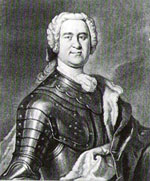 |
There is no doubt that Robert Burns was well aware of this and confirmation can be found in a letter of his written to Lady Winifred Maxwell Constable, of staunch Jacobite tendency. He saluted her "as a common sufferer in a cause where even to be unfortunate is glorious. “The cause of heroic loyalty". He then goes on to say that "though my fathers had not illustrious honours and vast properties to hand down, though they left their humble cottages only to add so many units more to the unnoted crowd that followed their leaders, yet, what they could, they did and what they had, they lost. With unshaken firmness and unconcealed political adventure, they shook hands with ruin for what they esteemed the cause of their King and Country".
Like many of Scotland's aristocracy and gentry, Robert was able to trace a royal ancestry going back to both Robert the Bruce and his sister Mary. He was also a descendant of King Robert II, the first Stewart ruler of Scotland, whose daughter married into the Keith's family. |
| Though born a decade after the 45, his Jacobitism was rampant and made all the more obvious when he took part to the birthday celebration of Charles Edward Stuart held in Edinburgh on December 31st, 1787. This, in itself, was still a treasonable act for which he could have been arrested and lost his life without trial. Fortunately, George III would have had to arrest most of Scotland's leading aristocracy, something he could hardly afford to do. Participating to the true King's birthday bash were some of the following people. Lady Nairn, author of 'Will ye no come back again', (whose father had been Prince Charles' aide de camp); James Murray of Abercairney; the Earl and Countess of Seaforth; the Duke of Perth; Oliphant of Gask (whose father had organized Prince Charlie's coronation in the Abbey of Holyrood House in September 1745); Thriepland of Fingask and Stuart, Lord Provost of Edinburgh. Burns and they, it must be noted, shared the same table on that glorious evening when all stood and drank 'to the King over the water'. |
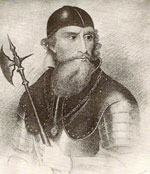 |
| That Burns was a Patriot can be seen by many of his physical action. Visiting the grave of his ancestor Robert the Bruce at Dunfermline Abbey, he knelt and kissed the stone. The winter of 1788/89 marked the centenary of the so-called glorious English revolution. Sick with disgust, he wrote to the Edinburgh Evening Courant a defence of the Stewarts in which he states "the Stewarts have been condemned and laughed at for their folly and impracticability of their attempts in 1715 and 1745. I cannot join in the ridicule against them...Let every man, who has a tear for the many miseries incident to humanity, feel for a family, illustrious as any in Europe, and unfortunate beyond historic precedent". |
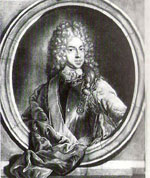 |
As well as collating Scottish poetry, he collated Jacobite works such as 'Lament for King James', 'There'll never be peace till Jamie comes hame', 'Scots wha hae', 'Caledonia', 'Charlie, he's my darling', 'Lament for Mary, Queen of Scots', 'Address to Edinburgh' and 'The Bonnie lass of Albany'. All these works show a fervent wish for the return of his lawful Royal House and Scottish Sovereignty and made Burns a growing threat to the British establishment. The bigger the following Burns was able to create, the bigger the threat of a Stuart restoration.
As a freemason, a tradition that came down to him through his Keith ancestry, the brotherhood of man had a place of prime importance in Burns' life. The outcome of his belonging to Freemasonry was a song that probably has been sung the world over. 'A man's a man for a' that' was the opening hymn of the Scottish Parliament in 1998. |
| Liberty and equality were things that Robert Burns treasured as well. But somehow, his 'Ode for General Washington's birthday' is one of the lesser known of his work, even in the United States of America. On the eve of the French Revolution, Burns wrote 'The rights of woman'. He even bought a canon which he was going to send to France as a donation to the 'People of France'. The canons, however, were confiscated before they could make their way from Edinburgh to France. The fact that his financial circumstances obliged him to work as an excise-man in Dumfries on behalf of a Government he neither believed in nor supported shows him to be a practical man, what is referred today as 'a canny Scot'. His work entailed travelling the countryside, where his newly found fame as a successful writer involved him, so we are told, in an excess of conviviality and private parties. However, he was never the addicted drinker as so many historians claimed. |
| Dying so young, in the prime of his years, we are reminded of our own mortality. We are also reminded that, no matter how short a life, anything is possible if we believe in the concepts of ideals and principles. Reading Burns' poetry, we become quickly aware that there is an answer for all situations. His 'Address to a toothache' just proves the point. For those short of cash, and this will, no doubt, apply to us all (except the Windsors of course), simply read Burns' 'Lines written on a bank-note'. For those who fought in both world wars (actually, any wars for that matter), a quick look at Burns' 'Soldiers return' will show that nothing much had changed between Burns' days and theirs. If he was a man of vision, he was also a man of wisdom, a Bard for all nations and he is revered and celebrated the world over. |
|
Following his death in 1796, his children by Jean Armour became, against their mother's wishes 'Wards of the State' and were forcibly taken to London and brought up in a pro-Hanoverian environment. None of his descendants would bother the State ever again.
|
Back to Top
|
